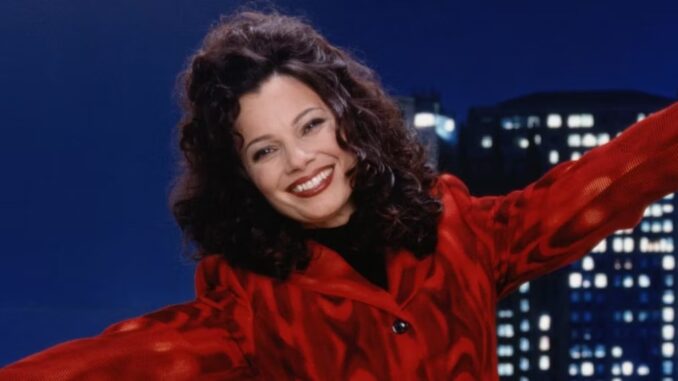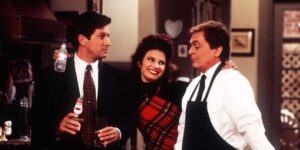
Watch any comedy film or TV show older than about five years, and it becomes abundantly clear just how hard it is to make comedy that lasts. With tastes in humor changing so rapidly, it’s a miracle that any comedy can be made and not be out of style at the time of release. Everyone has a story of revisiting comedies they loved when they were younger, only to wince and cringe at a lot of the jokes in hindsight. Dramas are much more safe in that regard. Going back to classics like The Godfather, or even something more modern like Moonlight, and they still hold up. Sitcoms though, are a much tighter balancing act. This is why it is so impressive that when revisiting the Fran Drescher-led TV show The Nanny, it still plays just as well as it did 30 years ago. Binging the show, currently available to stream on HBO Max, will slowly unravel just how Fran was able to wield humor like a weapon.
The show is centered around Fran Fine (played by Drescher herself), a woman over 30 who is down on her luck. After being dumped by her fiancé, and fired from her job, she ends up charming her way into working for the rich Broadway producer, Maxwell Sheffield (Charles Shaughnessy). As the theme song says, that’s how she became the nanny. Already this shows a reason why the show has aged so well.
The premise of it is classic, sounds familiar to practically anyone who has read Jane Eyre or anything by Jane Austen. The idea of someone from a lower class falling for someone else who is more upper crust, is literally a tale as old as time. With such a strong basis, and a clear hook of a will they/won’t they romance that typically serves as the main gimmick of most sitcoms, the show is already setting a good foot forward for being timeless.

The next step the show takes to create this unfailing sense of humor is that it combines the two basic types of sitcoms. These two styles are the workplace sitcom, like The Office and Parks and Rec, and the family and friend based sitcom, like Friends and Full House. In the show, everyone except Maxwell’s children that Fran watches over, are all coworkers but most of them still live under the same roof. This allows plot devices from both styles to be used and turned on their head by giving a fresh perspective. Fran is an employee of Maxwell, but as the nanny she also becomes a mother figure to his children. Eventually she even becomes (spoilers) his wife, making the line between family and workplace sitcom nonexistent. But the intermingling doesn’t just stop with them, it even extends to the supporting characters of the show, the enemies-to-lovers Niles (Daniel Davis) and C.C. Babcock (Lauren Lane). These two have, at a glance, what appears to be an intense animosity while still serving as Mr. Sheffield’s sassy butler and producing partner respectively.
At first, the rivalry between C.C. and Niles seems to be the basis of a lot of comedians’ jokes: insult comedy. The two are constantly making jabs at each other that only get harsher each time. It even effects their personal lives, Niles constant jokes at C.C.’s expense seem to be a contributing factor on why the character is depressed. C.C. makes comments often about her lonely life and how much she spends on therapy, which serves as a great foil to Fran. Niles, meanwhile, gets sadistically gleeful when messing with her. But what becomes clear very early on, is that everyone is in on the joke. The only reason C.C. rolls with the punches, and dishes out insults herself, is because she truly finds it funny. It’s sort of her darkly humorous love language. Her steely demo breaks several times throughout the show, slowly revealing that she is actually in love with Niles and they (again, spoilers) end up getting married. Outside of her odd romance with Niles, she even drops the insult act very early on in episodes where she admits that Fran is one of her closest friends, even if they remain rivals. While Fran is less successful monetarily, C.C. is at a very similar place in life. Both of them are not in the place of life they want to be in, both are very passionate about their work but make mistakes constantly, and both deeply care about others. Even if they don’t always have the best way of showing it. That’s why the comedy works so well, these co-workers are a legitimate family. None of the insults or crass humor ever feels cringey or malicious, because it’s so clear that everyone is in on the joke.
But that just covers the show’s characters and format. The show also excels at its actual comedic style and specific sense of humor. Not to sound too hyperbolic, but back in the ’90s Fran Drescher was the modern Lucille Ball. Frankly, no one has embodied her energy as well as Fran Drescher has, even though it has been decades since the show aired. Fran channels Ball with not only her sharp wit, but with her dedication to the craft.